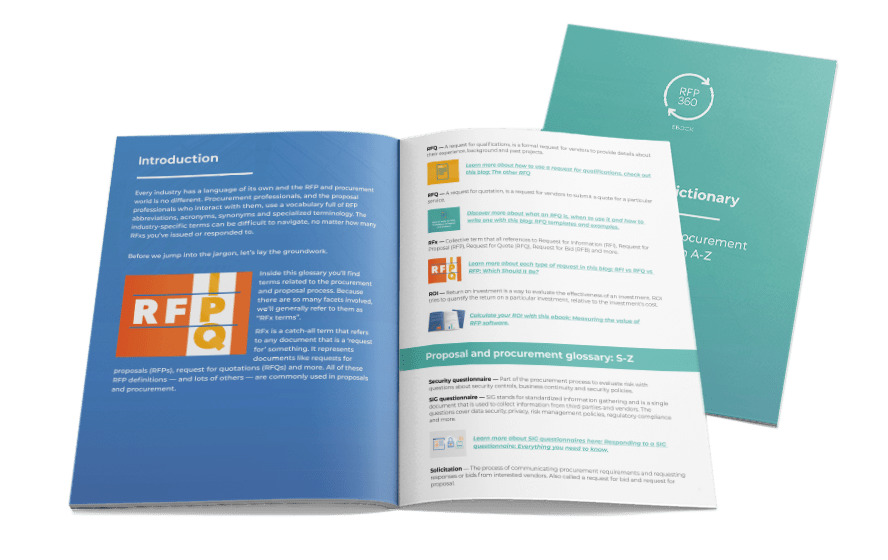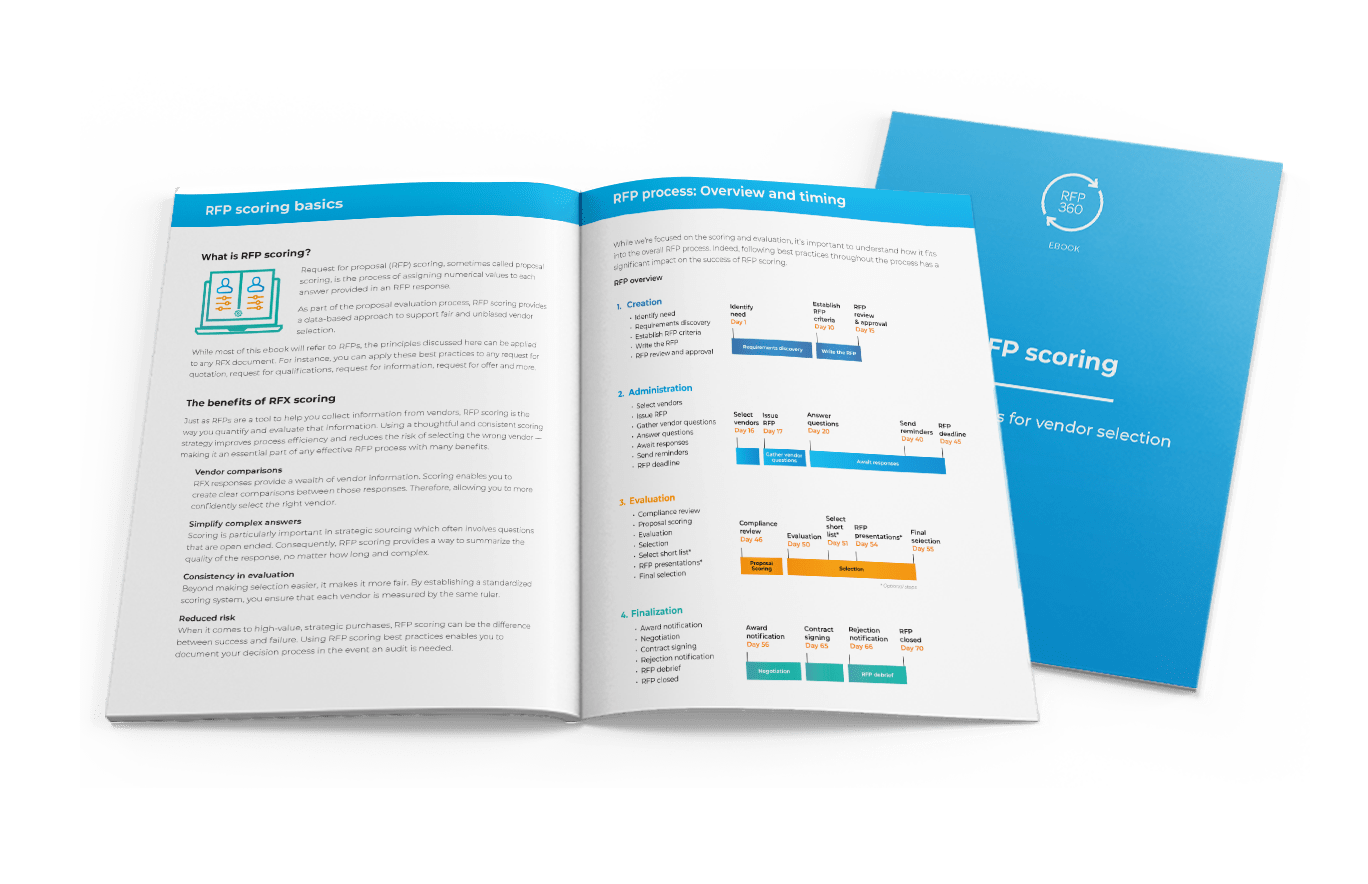Crafting a successful request for proposal (RFP) takes time, research and practice. But, most importantly, it requires you to ask the right RFP questions.
To figure out what you need to ask, you’ll first have to gather input from key stakeholders in your business. In addition, you must understand the current vendor landscape and know how the procurement project will impact the processes and people within your organization. Only then, once you’re armed with all of that context, will you be ready to condense it into effective RFP questions that are thoughtful, thorough and insightful.
Asking the right RFP questions means using a combination of project-specific questions gleaned from stakeholders as well as standard RFP questions. It’s a lot of work, but it’s crucial. After all, no procurement manager wants to be the one responsible for selecting the wrong vendor after an extensive search.
Fortunately, with the right preparation, you can craft an RFP that encourages vendors to respond and solicits all the information you need to pick the perfect vendor for your organization. In this blog, I’ll briefly explain why it’s important to ask vendors the right RFP questions. Then, I’ll provide a guide for gathering information from stakeholders on your team. Finally, I’ll offer an overview of standard RFP questions to ask vendors.
Table of Contents
- The importance of asking vendors the right questions
- Questions to ask yourself before you begin
- What to ask your team and stakeholders
- RFP questions to ask vendors
The importance of asking vendors the right questions
Ultimately, the purpose of a request for proposal is to simplify the supplier selection process. It gives you an apples-to-apples view of what each vendor has to offer and enables objectivity. In addition, when it comes to complex, high-value indirect spend, asking the right questions and using RFP weighted scoring are a winning combination. It ensures that your RFP results reflect the unique priorities of your business.
Consequently, all of these benefits make RFPs the go-to tool for finding partners that maximize value and minimize risk. However, all of those benefits hinge on asking the right RFP questions.
Questions to ask yourself before you begin
Before you ask any RFP questions to vendors, there are a few questions you should ask yourself. Considering these questions will ensure your project starts off on the right foot and can be executed efficiently and effectively.
Are you ready for an RFP?
Sometimes, an RFP isn’t the best tool for your procurement project. If you’re looking to check a price, identify the most qualified vendor or gather information about the market for planning purposes, an RFP is not the way to go. For example, you may need to first send a request for information (RFI), request for qualification (RFQ) or request for quotation (RFQ).
Even if you decide that another RFX process is the best first step, much of the advice contained here still applies. So, read on for helpful tips for RFQ and RFI questions to ask vendors.
Who will serve as the procurement manager or project lead?
The RFP process can be complicated. Accordingly, it’s important to ensure that everyone knows their role, including who is ultimately responsible for moving the process forward. Not only is this information important for your internal stakeholders, but it is also helpful to include a single point of contact for vendors who many have questions.
Naturally, we recommend centralizing everything in an RFP management system like RFP360. Housing all these inquiries, updates and decisions in one place, managed by one person (in collaboration with others) shortens your RFP timeline, establishes consistency and ensures projects are delivered on time and within budget.
To explore the RFP process in detail, download the ultimate RFP process guide ebook.
Which teams and individuals will serve as stakeholders and evaluators?
Generally, every procurement project needs input from the department making the request. In addition, most require additional teams and individuals to establish requirements, evaluate vendor responses and approve terms or contracts. For example, many RFPs will involve IT, procurement and legal departments. The earlier you include them, the better. In addition, it is helpful to use a RACI matrix to clarify roles and responsibilities.
Questions for your team and stakeholders
Now that you’ve determined that an RFP is the right tool and identified your stakeholders, you’re one step closer to writing an effective RFP. It’s time to tap into the knowledge, advice and expertise of your team during stakeholder interviews.
The goal of this step is to identify your crucial needs and wants which will determine your RFP criteria. Then, armed with that information, you can build a project scope that guides the creation of your RFP. Defining your scope at the beginning of the process saves you countless miscommunications and setbacks later.
What is the project budget?
While price probably shouldn’t be your only (or even primary) consideration, it’s always important. Establish your financial expectations and limitations early on. Otherwise, you risk falling in love with a solution or product you can’t afford. Remember, it’s also critical to have input and approval from your executives or c-suite regarding your budget before you start looking for providers.
What are the end goals of the project?
Clearly define the problem you’re trying to solve as well as what the ideal solution would be. Ask stakeholders what success would look like. Would it be a more efficient process, a better quality product or an improved outcome? What factors about the product or service contribute to that goal?
What factors are crucial deal breakers?
Ask your team what would immediately eliminate a candidate. This criteria will help shorten the evaluation process. Here are some examples of common deal-breakers:
- Critical audit findings
- Failure to meet security standards
- Lack of defined policies or procedures
- Inability to meet budget or timeline requirements
- Use of unvetted sub-contractors
- Customer support concerns (outsourced, language barrier, etc.)
- Lack of client references
- Custom development required
Which factors of the product or service are most important?
First, brainstorm with your stakeholders to create a list of available features and functionality. Then, label each of these items according to their priority: must have, nice to have, future need or not in scope. Establishing this list will help keep you from being swayed by flashy features. In addition, it will make the selection process easier and keep your project within budget.
Will the RFP be a multi-step process?
What steps will be involved in the RFP process? Will the RFP stand alone and be comprehensive? Or will the process start with an RFQ, proceed to an RFP lite and conclude with RFP presentations for the shortlisted finalists?
The multi-step approach is a great way to keep the process easy for everyone. Beginning by qualifying vendors requires a lower level of effort for interested vendors and will encourage participation. Gather initial information by asking RFI questions to vendors. Ask deal breaker questions early to narrow the field. Then, when left with four to seven vendors, proceed to RFP. In this phase you can ask more detailed questions and ensure vendors feel more invested.
How will vendors be evaluated and scored?
One common mistake in procurement is not finalizing the supplier evaluation and scoring system before sending an RFI/RFP. This creates a problem, both for your team and for your selected suppliers. After all, how can you measure success if you’re not sure what you’re assessing? In addition, how can your vendors create tailored proposals if they don’t know how they’ll be assessed?
For more information about scoring your RFP questions, check out this ebook: The RFP scoring guide.

After you work with your team to answer these questions, you can start to write your RFP. Remember, all of the information you’ve just collected is not only helpful to your process but also valuable to your vendors. Include as much information, background and context as possible to ensure you get relevant, insightful responses.
Questions to ask your vendors
Now it’s time to start putting your RFP questions for vendors together. Use the information you’ve discovered from your internal discussions and research to create customized sections and questions. In most cases, it’s wise to ask a mixture of open-ended and closed-ended questions. This gives vendors some room to impress and surprise you, but also provides some easy-to-score responses.
Most of the procurement teams we work with rely heavily on RFP templates so we decided to create a free RFP template (.doc) to share with everyone.

While templates are a great way to save time and avoid rewriting standard questions, remember to follow RFP best practices. Namely, you must carefully review each template to ensure that the RFP questions make sense for the current project.
In addition to the standard RFP questions below, include questions based on stakeholder feedback as well as category-specific questions. You can also kick start your efforts with our list of 101 sample RFP questions. This list includes RFP questions for vendors, software RFP questions, technical RFP questions and more.
Discover industry-specific RFP questions
Your vendors are experts in their field, and typically, they are eager to help you build your RFP. Indeed, many vendors have an RFP template at hand to provide to prospects. When you read the RFP, you’ll discover questions you may not have known to ask. However, keep an eye out for any questions that seem to heavily favor the vendor that provided the RFP template. On the other hand, if you prefer to have an unbiased industry expert on your side, consider hiring an RFP consultant, posting in industry forums, LinkedIn groups and trade publications.
Standard RFP questions for vendors
Who is your competition?
This question is important for two reasons. First, is the company honest? How they answer this question will tell you a lot about how they do business. If they’re not willing to say who their competitors are, or why they lose to them, you might want to question their overall transparency. Second, have you considered their competitors for the project? If they mention a company you haven’t included in your RFP, do a little research to discover if their competitor is a better option.
How will your customer success team help us meet our goals?
Successful supplier relationship management is an ongoing process. One of the biggest factors in the long-term success of your project is ensuring that you have the support you need to accomplish your goals. Consequently, it’s crucial to ask customer success questions. What is the implementation timeline? Who will be involved in training and onboarding? Are there additional fees for support? How and when can your team get into contact with a customer success representative?
Can we reach out to references and see case studies similar to our use case?
Reference questions for vendors let you hear feedback directly. Certainly talking with a current customer is a great way to get an unfiltered take on the product or service. You can ask what went well, what they’d do differently and what advice they have for you. On the other hand, if you can’t talk directly to a customer, ask for relevant case studies. Then, ask follow up questions to explore any differences between your use case and the provided case studies.
How will you protect our organization from risk?
Security questions should always be a part of your vendor due diligence process. To better understand what is required, ask your IT team what they need to know to ensure success. Are certain accreditations or standards of security required? How are communications processed? Additionally, ensure ongoing compliance with security questionnaires.
How Responsive can help
We offer a full-circle, integrated RFP software that encourages collaboration with internal stakeholders and simplifies the process of gathering and evaluating vendor proposals.
“Responsive helps us automate and focus on core business. Now, we can categorize, search, and profile providers, which helps us understand who would be the most appropriate vendors to invite to a particular RFP. We love the automated scoring. We’re shortlisting faster, and we’re being a true partner to our vendors. It’s a win-win.” – Mark Rieder, SVP of HR technologies and benefits administration at NFP.
